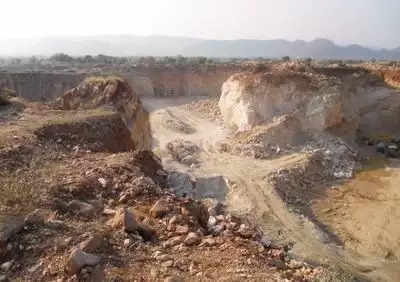- News
- Business News
- India Business News
- Economic Survey suggests creating strategic mineral reserves like petroleum stocks
Trending
This story is from January 31, 2023
Economic Survey suggests creating strategic mineral reserves like petroleum stocks

NEW DELHI: Underlining the importance of critical minerals in India’s green transition, the Economic Survey on Tuesday expressed the need for creating “strategic mineral reserves” in the country along the lines of "strategic petroleum reserves" to ensure a continuous supply of these scarce unevenly distributed resources.
These minerals, including cobalt, copper, lithium, nickel and rare earth elements (REEs), are critical for producing Lithium-ion batteries for electrical vehicles (EVs) and harnessing solar power and wind energy.

Since India has low reserves of these critical minerals, the country has to depend on China, the United States, Chile, Argentina, Brazil, Russia, Ukraine and Vietnam for the one or the other critical minerals. The ongoing Russia-Ukraine war has recently disrupted the supply, resulting in high cost of these minerals.
The survey, at the same time, also suggested that there should be policies to consider investment in internal research including technological innovation for mineral exploration and processing and the development of Recycling, Reusing and Repurposing (R3) technologies -- tools for urban mining of these resources through circularity.
Noting that the skewed distribution of the resource poses a supply risk in the face of its enhanced demand, the survey also said a carefully crafted multi-dimensional mineral policy would reduce the country’s dependence and address the problems for the future.
In order to ensure mineral security, the ministry of mines has already created a joint venture company, namely Khanij Bidesh India Ltd (KABIL), with participating interests of NALCO, HCL and MECL. The KABIL is mandated to identify and acquire overseas mineral assets of critical and strategic nature, such as lithium, cobalt etc.
Exploring such critical minerals is one of the key objectives of India's Deep Ocean Mission. The government will deploy a specially designed vehicle — called MATSYA 6000 — by 2026 to explore critical minerals.
The types of mineral resources used vary by technology. Lithium, nickel, cobalt, manganese and graphite are crucial to battery performance, longevity and energy density whereas REEs are essential for permanent magnets that are vital for wind turbines and EV motors. On the other hand, electricity networks need a huge amount of copper and aluminium, with copper being a cornerstone for all electricity-related technologies.
These minerals, including cobalt, copper, lithium, nickel and rare earth elements (REEs), are critical for producing Lithium-ion batteries for electrical vehicles (EVs) and harnessing solar power and wind energy.

Since India has low reserves of these critical minerals, the country has to depend on China, the United States, Chile, Argentina, Brazil, Russia, Ukraine and Vietnam for the one or the other critical minerals. The ongoing Russia-Ukraine war has recently disrupted the supply, resulting in high cost of these minerals.
In this backdrop, the suggestion for creating “strategic mineral reserves” may be a significant step for India’s green transition. “The country has resources of nickel, cobalt, molybdenum and heavy REEs, but further exploration would be needed to evaluate the quantities of their reserves,” said the survey.
The survey, at the same time, also suggested that there should be policies to consider investment in internal research including technological innovation for mineral exploration and processing and the development of Recycling, Reusing and Repurposing (R3) technologies -- tools for urban mining of these resources through circularity.
Noting that the skewed distribution of the resource poses a supply risk in the face of its enhanced demand, the survey also said a carefully crafted multi-dimensional mineral policy would reduce the country’s dependence and address the problems for the future.
In order to ensure mineral security, the ministry of mines has already created a joint venture company, namely Khanij Bidesh India Ltd (KABIL), with participating interests of NALCO, HCL and MECL. The KABIL is mandated to identify and acquire overseas mineral assets of critical and strategic nature, such as lithium, cobalt etc.
Exploring such critical minerals is one of the key objectives of India's Deep Ocean Mission. The government will deploy a specially designed vehicle — called MATSYA 6000 — by 2026 to explore critical minerals.
The types of mineral resources used vary by technology. Lithium, nickel, cobalt, manganese and graphite are crucial to battery performance, longevity and energy density whereas REEs are essential for permanent magnets that are vital for wind turbines and EV motors. On the other hand, electricity networks need a huge amount of copper and aluminium, with copper being a cornerstone for all electricity-related technologies.
End of Article
FOLLOW US ON SOCIAL MEDIA















